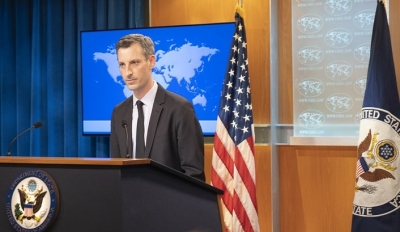By Arul LouisNew York, March 23 : State Department Spokesperson Ned Price has acknowledged that India developed defence ties with Russia because the US was not ready for such a relationship when the Soviet Union and India drew close.
But he said on Tuesday that despite India’s historical relationship with Russia, the US is a “partner of choice” for New Delhi and the ties with Washington, including in the defence and security evolve.
Price made the observations when asked by a reporter at his briefing about President Joe Biden’s statement on Monday that among the Quad partners India was “shaky” in isolating Russia over its invasion of Ukraine.
“You raised an interesting issue of history versus where we are now,” Price said.
The ties began with the Soviet Union and continued with Russia after the communist mega-state disintegrated.
He referred to Under Secretary of State Victoria Nuland’s statement in New Delhi on Monday that India had a historic defence relationship with Russia.
Price said, “It was a very different time, different considerations, but those times have changed.”
“They’ve changed in terms of our willingness and ability to be a strong defence and security partner of India,” and has deepened over the past 25 years or so with bipartisan support, he said.
He credited Republican former President George W.Bush for boosting the closer relationship with India.
“It is a legacy in large part of the George W.Bush administration, where we have seen this bilateral relationship between the United States and India evolve and change for the better and deepen in a number of ways, including in our defence and security relationship,” he said.
“Historical relationships notwithstanding, we are a partner of choice for India now, as are many of our partners and allies around the world,” he said.
He explained that the closer relationship with India is centred around the shared interests in the Indo-Pacific.
“In terms of our relationship with India in the Quad context and the bilateral context, we know that India is an essential partner for us in realising our shared vision of a free and open Indo-Pacific,’ Price said.
“That is really at the heart of the Quad’s goals,” he said.
The Quad made up of India, the US, Japan and Australia is united in the opposition to Chinese aggression in the Indo-Pacific region.
During their interactions with India and the Quad, Biden and Secretary of State Antony Blinken have reaffirmed their “commitment to a free and open Indo-Pacific in which the sovereignty and territorial integrity of all states are respected, and countries are free from military, economic, and political coercion,” he said.
Those principles were again affirmed by Biden and Prime Ministers Narendra Modi of India, Scott Morrison of Australia and Fumio Kishida of Japan at their summit on March 3, he said.
“They also reaffirmed their dedication to the Quad as a mechanism to promote regional stability and security,” he added.
While answering another question about the US relations with countries in the Middle East, Price spoke of the cooperation with India there.
He referred to the “trilateral relations” between the US, India and UAE and said, “It’s a relationship, a trilateral relationship that we will continue to invest in and continue to develop.”
In fact, in what could be the seed of another Quad, India’s External Affairs Minister S.Jaishankar, Secretary of State Antony Blinken and Foreign Ministers Yair Lapid of Israel and Sheikh Abdullah bin Zayed of the UAE held a virtual meeting while the Indian minister was visiting Israel in October and agreed to cooperate in maritime security and discussed future cooperation regionally and globally.
The India-US Civil Nuclear Agreement reached in 2005 between Bush and then-Prime Minister Manmohan Singh sealed the new chapter in relations between the two countries.
Improvements in ties that began before the agreement that set the stage for the virtual recognition of India as a nuclear power entitled to international nuclear cooperation in civilian fields, took off under subsequent Republican and Democratic administrations.
Although the US had come to the aid of India following its defeat in the 1962 China War, as a member of a military alliance with Pakistan, the Central Treaty Organisation (CENTO) Washington was lukewarm towards India and turned definitely hostile to India during the Bangladesh War of Independence in 1971.
While US arms poured into Pakistan, India turned to the Soviet Union and in 1971 signed a treaty of friendship with it incorporating mutual strategic cooperation.
While India’s relations with the US and its allies have grown since then, New Delhi is still dependent on Russia for a major portion of its defence needs making a break with Moscow — or riling it up — almost an impossibility now.
Without the continued Russian defence supplies, India would find it difficult to stand up to China’s aggression — the driving force behind the Quad and the US Indo-Pacific strategy.
(Arul Louis can be reached at [email protected] and followed @arulouis)
arul/dpb
#India #developed #Russia #spokesperson #Delhi #Narendra Modi # Manmohan Singh # Narendra Modi #Manmohan #Jaishankar #Shankar #Mohan # Jaishankar #New York #Washington #China #Delhi #New Delhi #New York #Washington #Moscow #Democratic #Republican #Narendra
.






